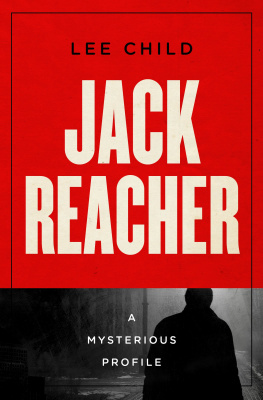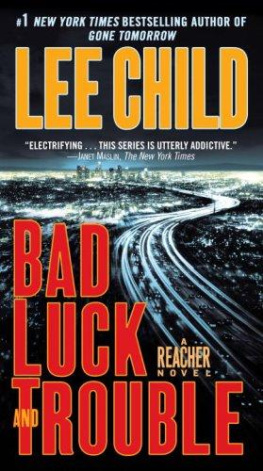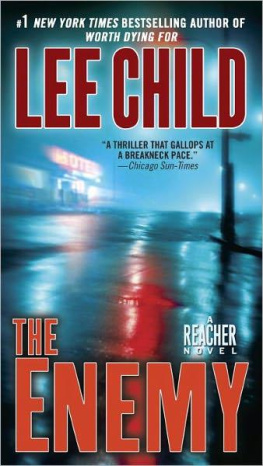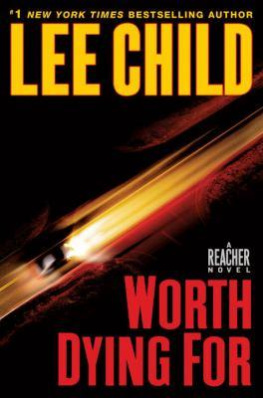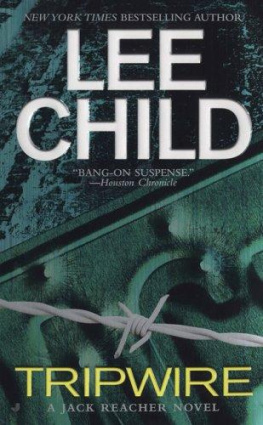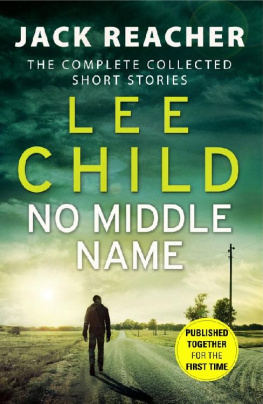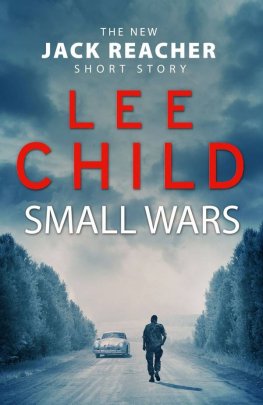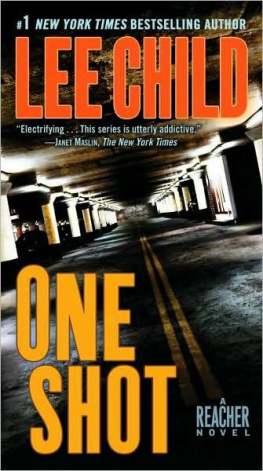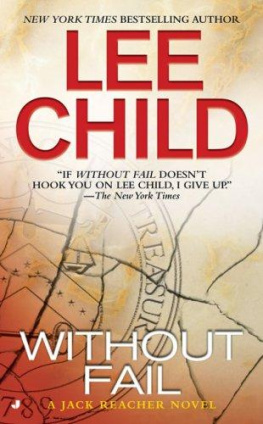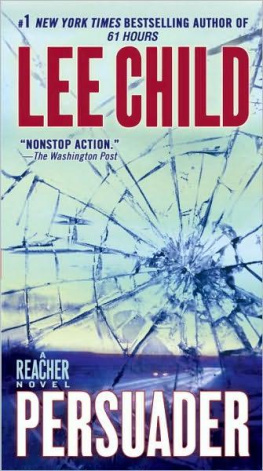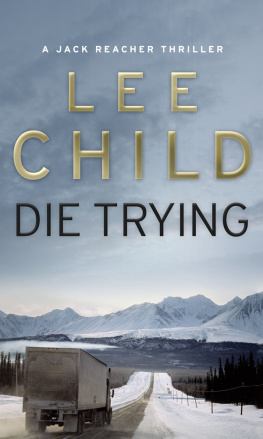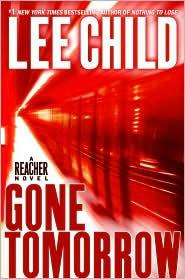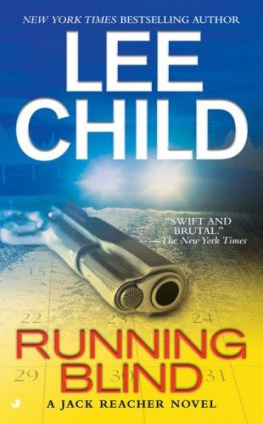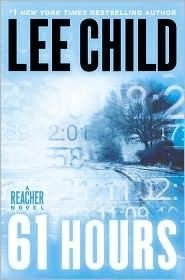Lee Child - Jack Reacher: A Mysterious Profile
Here you can read online Lee Child - Jack Reacher: A Mysterious Profile full text of the book (entire story) in english for free. Download pdf and epub, get meaning, cover and reviews about this ebook. year: 2022, publisher: Open Road Media, genre: Detective and thriller. Description of the work, (preface) as well as reviews are available. Best literature library LitArk.com created for fans of good reading and offers a wide selection of genres:
Romance novel
Science fiction
Adventure
Detective
Science
History
Home and family
Prose
Art
Politics
Computer
Non-fiction
Religion
Business
Children
Humor
Choose a favorite category and find really read worthwhile books. Enjoy immersion in the world of imagination, feel the emotions of the characters or learn something new for yourself, make an fascinating discovery.
- Book:Jack Reacher: A Mysterious Profile
- Author:
- Publisher:Open Road Media
- Genre:
- Year:2022
- Rating:3 / 5
- Favourites:Add to favourites
- Your mark:
- 60
- 1
- 2
- 3
- 4
- 5
Jack Reacher: A Mysterious Profile: summary, description and annotation
We offer to read an annotation, description, summary or preface (depends on what the author of the book "Jack Reacher: A Mysterious Profile" wrote himself). If you haven't found the necessary information about the book — write in the comments, we will try to find it.
Jack Reacher: A Mysterious Profile — read online for free the complete book (whole text) full work
Below is the text of the book, divided by pages. System saving the place of the last page read, allows you to conveniently read the book "Jack Reacher: A Mysterious Profile" online for free, without having to search again every time where you left off. Put a bookmark, and you can go to the page where you finished reading at any time.
Font size:
Interval:
Bookmark:

Lee Child

Jack Reacher
How far back should I go with this? Reacher made his first appearance in print on March 17, 1997Saint Patricks Daywhen Putnam published Killing Floor in the US, which was Reachersand mydebut. But I can trace his genesis backward at least to New Years Eve 1988. Back then I worked for a commercial television station in Manchester, England. I was eleven years into a career as a presentation director, which was a little like an air traffic controller for the network airwaves. In February of 1988, the UK commercial network had started twenty-four-hour broadcasting. For a year before that, management had been talking about how to man the new expanded commitment. None of us really wanted to work nights. Management didnt really want to hire extra people. End of story. Stalemate. Impasse.
What broke it was the offer of a huge raise. We took it, and by New Years Eve we were ten fat and happy months into the new contract. I went to a party but didnt feel much like celebrating. Not that I wasnt content in the short termI sleep better by day than night, and I like being up and about when the world is quiet and lonely, and for sure I was having a ball with the new salary. But I knew in my bones that management resented the raise, and that the new contract was in fact the beginning of the end. Sooner or later, we would all be fired in revenge. I felt it was only a matter of time. Nobody agreed with me except one woman.
At the party, in a quiet moment, she asked me, What are you going to do when this is all over?
I said, Im going to write books. Why that answer? And why then?
I had always been an insatiable reader. All genres, all the time, but very unstructured. I naturally gravitated toward crime, adventure, and thrillers, but for a long time in the UK we lacked genre stores and fan magazines, and of course the Internet hadnt started yet, so there was no effective network capable of leading a reader from one thing to the next. As a result, I had come across some very obscure stuff while being completely ignorant of many major figures. For instance, in February of 1988while the ink was still drying on our new TV contractsI took a vacation in the Yucatan. I flew back via Miami and picked up John D. MacDonalds The Lonely Silver Rain at the bookstall in the airport. I had never heard of MacDonald or Travis McGee. I read the book on the plane back to London and loved it.
I was back in the States at Easter that year and bought every McGee title I could find, which added up to about a linear yards worth.
Nobody needs me to sing MacDonalds praises, but that yard of books did more for me than provide excellent entertainment. For some reason the McGee books spoke to me like textbooks. I felt I could see what MacDonald was doing, and why, and how, as if I could see the skeleton beneath the skin. I read them all that summer, and by New Years Eve I was completely sure that when the ax fell, I wanted to do what MacDonald had done. I could stay in the entertainment business but work for myself in the world of books.
It took six years for the ax to fall. But fall it did, and so it came time to make good on that earlier ambition. I went to W.H. Smiths store in the Manchester Arndale mallwhich the IRA destroyed a year laterand bought three legal pads, a pencil, a pencil sharpener, and an eraser. The bill was a penny under four pounds.
(I read Ngaio Marshs essay in Otto Penzlers 1978 book The Great Detectives , and she reports doing very much the same thing, except that 1931 prices were radically lower than 1994s, and she didnt buy an erasermaybe she already had one, or was more self-confident than I was.) Then I sat down with my purchases and let years of half-formed thoughts take shape. But not just six years of thoughts now I have to take the process back another thirty years or so, to the point when my reading habit first took hold.
I had found that I liked some things in books and disliked other things. I had always been drawn to outlaws. I liked cleverness and ingenuity. I liked the promise of intriguing revelations. I disliked a hero who was generally smart but did something stupid threequarters of the way through the book, merely to set up the last part of the action. Detectives on the trail who walked into rooms and got hit over the head from behind just didnt do it for me. And I liked winners. I was vaguely uneasy with the normal story arc that has a guy lose, lose, lose before he wins in the end. I liked to see something done spectacularly well. In sports, I liked crushing victories rather than ninth-inning nail-biters.
Some of my reading was directed, of course, in school. I was part of probably the last generation ever to receive a classical English education. I read Latin and Greek and Old English, all the ancient myths and medieval sagas and poems. I met the knight errant at its source.
Then I took a law degree at university. I never intended to be a lawyer, but the subject knit together all my nonfiction interests history, politics, economics, sociology and language. Legal language strives for concision and avoids ambiguity wherever possible. The result is inevitably dull, but all that striving and avoiding really teaches a person how to write.
Then I went to work in the theater, which back then featured plenty of experimental theater, some of it good, most of it awful, and I developed a growing contempt for those who saw their minimal audiences as badges of honor.
The public is too stupid to understand us, they would say.
I hated that attitude. To me, entertainment was a transaction. You do it, they watch it, then it exists. Like a Zen question: If you put on a show and nobody comes, have you in fact put on a show at all?
So for me, the audience mattered from the start. Which helped me thrive in television. And along the way, I discovered I was the audience. We were generally doing quality mass-market entertainment, but even so, some guys were conscious of slumming. Not me.
G. K. Chesterton once said of Charles Dickens, Dickens didnt write what people wanted. Dickens wanted what people wanted. I would never compare myself to Charles Dickens, but I know exactly what Chesterton meant.
So, at thirty-nine years of age, after maybe thirty-five years of conscious experience, I sat down and opened the first of my three legal pads on my dining room table and lined up my pencil and sharpener and eraser and thought some more, and came up with three specific conclusions.
First: Character is king. There are probably fewer than six books every century remembered specifically for their plots. People remember characters. Same with television. Who remembers the Lone Ranger? Everybody. Who remembers any actual Lone Ranger story lines? Nobody.
So my lead character had to carry the whole weight and there was a lot of weight to carry. Remember, I was broke and out of work.
Second conclusion: If you can see a bandwagon, its too late to get on. I think the person who said that to me was talking about investment issuesas if I had anything to investbut it seemed an excellent motto for entertainment as well. Its a crowded field. Why do what everyone else is doing?
So I was going to have to do something a little different. It seemed to me that the mystery series that were then well under wayand most that were just starting outwere, when carefully analyzed, soap operas. (Which to me is not a derogatory term. Soap opera is an incredibly powerful narrative engine, and soap operas had put food on my table for eighteen years. Lots of it, and high quality.) Lead characters were primus inter pares in a repertory cast, locations were fixed and significant, employment was fixed and significant. In other words, series heroes had partners, friends, jobs, apartments, favorite bars, favorite restaurants, neighbors, family, even dogs and cats. They jogged, worked out, had pastimes. They had bills to pay and issues to resolve.
Font size:
Interval:
Bookmark:
Similar books «Jack Reacher: A Mysterious Profile»
Look at similar books to Jack Reacher: A Mysterious Profile. We have selected literature similar in name and meaning in the hope of providing readers with more options to find new, interesting, not yet read works.
Discussion, reviews of the book Jack Reacher: A Mysterious Profile and just readers' own opinions. Leave your comments, write what you think about the work, its meaning or the main characters. Specify what exactly you liked and what you didn't like, and why you think so.

